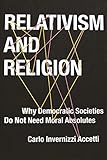Relativism and Religion : Why Democratic Societies Do Not Need Moral Absolutes / Carlo Accetti.
Material type: TextSeries: Religion, Culture, and Public Life ; 25Publisher: New York, NY : Columbia University Press, [2015]Copyright date: 2015Description: 1 online resource (288 p.)Content type:
TextSeries: Religion, Culture, and Public Life ; 25Publisher: New York, NY : Columbia University Press, [2015]Copyright date: 2015Description: 1 online resource (288 p.)Content type: - 9780231170789
- 9780231540377
- 100 23
- BT83.59 .A224 2015
- online - DeGruyter
| Item type | Current library | Call number | URL | Status | Notes | Barcode | |
|---|---|---|---|---|---|---|---|
 eBook
eBook
|
Biblioteca "Angelicum" Pont. Univ. S.Tommaso d'Aquino Nuvola online | online - DeGruyter (Browse shelf(Opens below)) | Online access | Not for loan (Accesso limitato) | Accesso per gli utenti autorizzati / Access for authorized users | (dgr)9780231540377 |
Browsing Biblioteca "Angelicum" Pont. Univ. S.Tommaso d'Aquino shelves, Shelving location: Nuvola online Close shelf browser (Hides shelf browser)

|

|

|

|

|

|

|
||
| online - DeGruyter Sprezzatura : Concealing the Effort of Art from Aristotle to Duchamp / | online - DeGruyter Why America Misunderstands the World : National Experience and Roots of Misperception / | online - DeGruyter Green Capital : A New Perspective on Growth / | online - DeGruyter Relativism and Religion : Why Democratic Societies Do Not Need Moral Absolutes / | online - DeGruyter A Political Economy of the Senses : Neoliberalism, Reification, Critique / | online - DeGruyter Charlie Munger : The Complete Investor / | online - DeGruyter Ethnic Conflict and Protest in Tibet and Xinjiang : Unrest in China's West / |
Frontmatter -- CONTENTS -- Acknowledgments -- Introduction -- 1. The Discourse of Anti-Relativism in the Political Thought of the Catholic Church -- 2. Elements for a Public Critique of the Catholic Discourse of Anti-Relativism -- 3. Rationalism: Between Relativism and Religion -- 4. Defense of a Relativist Conception of Democracy -- Conclusion -- Notes -- Bibliography -- Index
restricted access online access with authorization star
http://purl.org/coar/access_right/c_16ec
Moral relativism is deeply troubling for those who believe that, without a set of moral absolutes, democratic societies will devolve into tyranny or totalitarianism. Engaging directly with this claim, Carlo Invernizzi Accetti traces the roots of contemporary anti-relativist fears to the antimodern rhetoric of the Catholic Church and then rescues a form of philosophical relativism for modern, pluralist societies, arguing that this viewpoint provides the firmest foundation for an allegiance to democracy.In his analyses of the relationship between religious arguments and political authority and the implications of philosophical relativism for democratic theory, Accetti makes a far-ranging contribution to contemporary debates over the revival of religion in politics and the conceptual grounds for a commitment to democracy. He presents the first comprehensive genealogy of anti-relativist discourse and reclaims for English-speaking readers the overlooked work of Hans Kelsen on the connection between relativism and democracy. By engaging with contemporary attempts to replace the religious foundation of democratic values with a neo-Kantian conception of reason, Accetti also makes a powerful case for relativism as the best basis for a civic ethos that integrates different perspectives into democratic politics.
Mode of access: Internet via World Wide Web.
In English.
Description based on online resource; title from PDF title page (publisher's Web site, viewed 20. Nov 2024)


